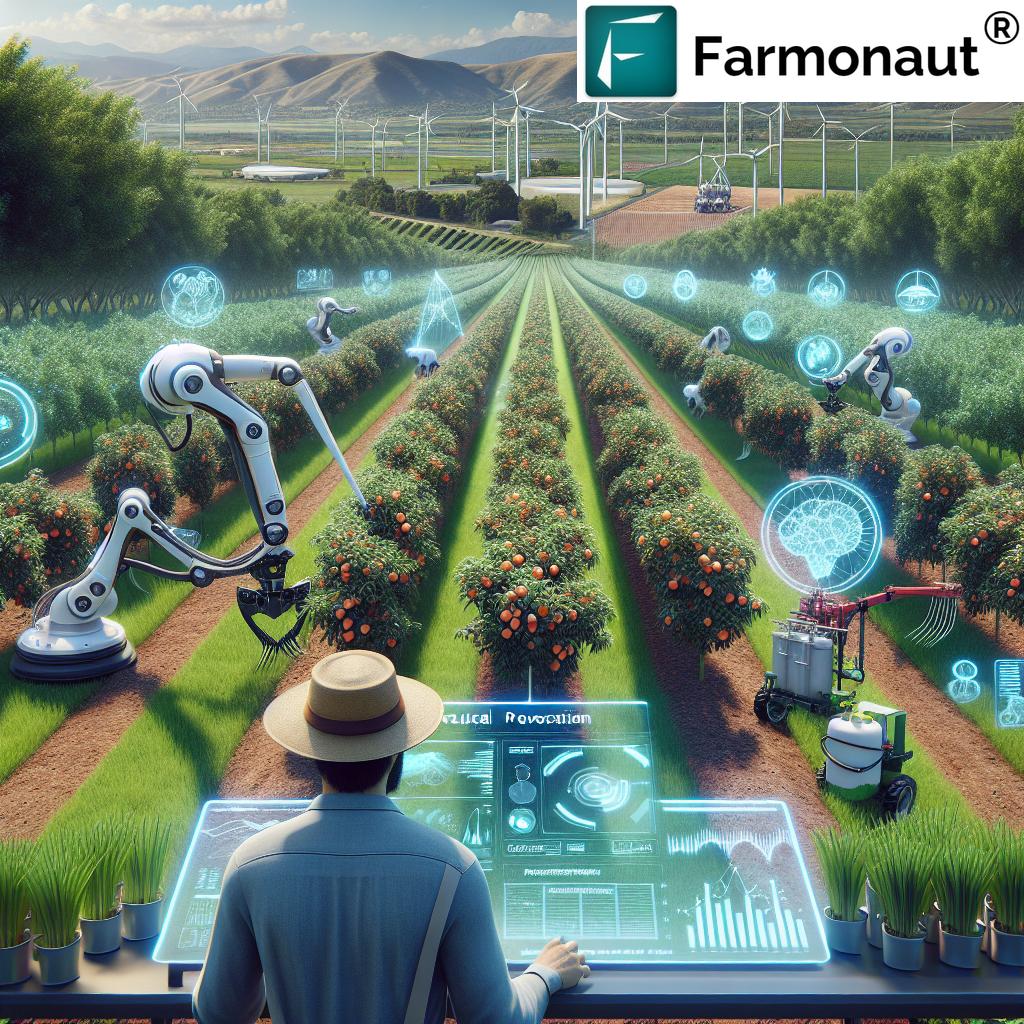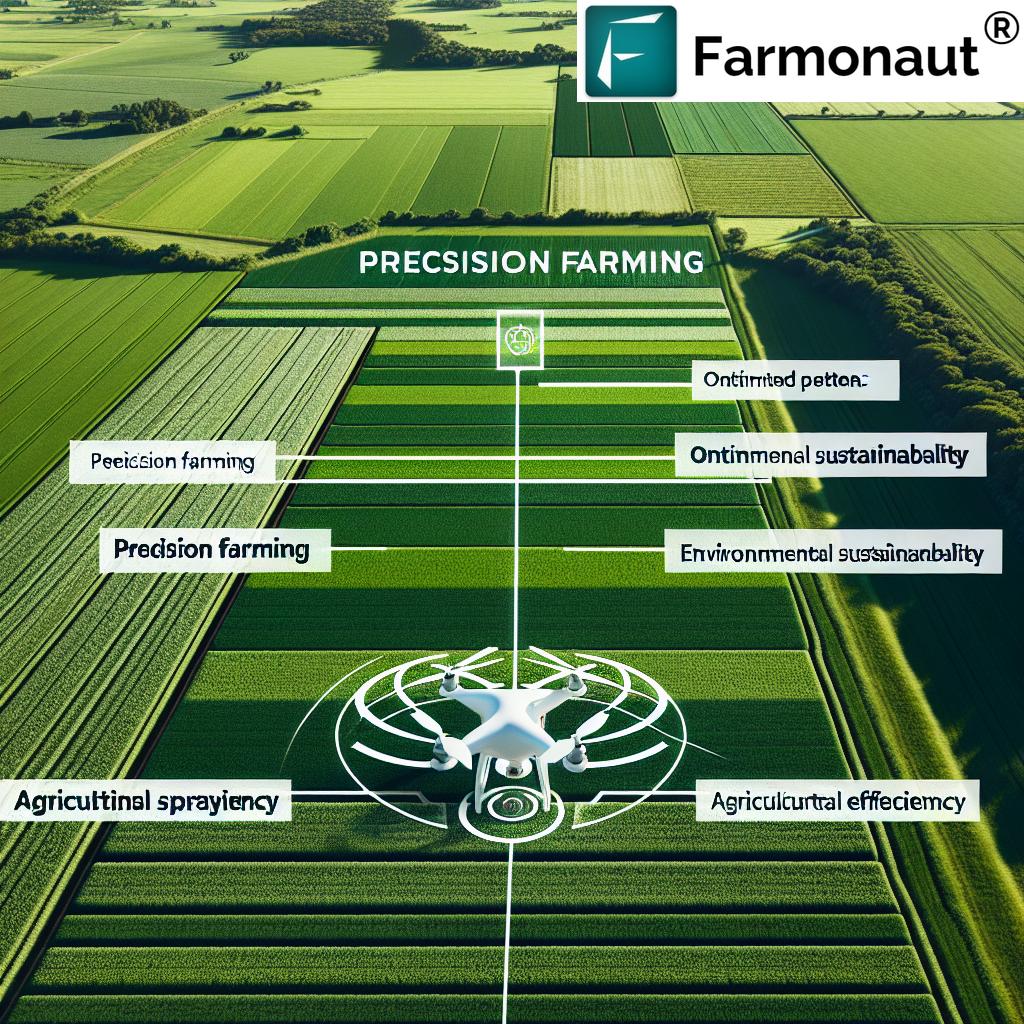Revolutionizing South Carolina Farming: How AI and Drones Are Empowering Small Farmers with Sustainable AgriTech Solutions
“AI-powered autonomous robots can reduce manual labor in farming by up to 30%, increasing efficiency for small farmers.”
In the heart of South Carolina, a revolution is taking root. As we step into a new era of agriculture, we’re witnessing the transformation of traditional farming practices through the power of artificial intelligence (AI) and drone technology. This groundbreaking shift is not just about innovation; it’s about empowering our small farmers, preserving our agricultural heritage, and ensuring a sustainable future for South Carolina’s farms.
At Farmonaut, we’re proud to be at the forefront of this agricultural revolution, offering cutting-edge precision agriculture technology that’s accessible to farmers of all sizes. Our mission aligns perfectly with the recent developments in South Carolina, where a significant grant is set to change the face of farming in the state.
The Dawn of a New Agricultural Era in South Carolina
The U.S. Department of Agriculture has recently awarded a substantial grant of $749,656 to the Public Service & Agriculture Center of Applied Artificial Intelligence for Sustainable Agriculture at South Carolina State University. This funding marks a pivotal moment in the state’s agricultural history, aimed at equipping farmers with innovative tools to overcome modern farming challenges while boosting operational efficiency.

Under the leadership of Joe Mari Maja, the center’s principal investigator, a suite of advanced technologies is set to be introduced. These include:
- Drones for monitoring plant health
- AI-powered autonomous robots capable of:
- Weeding
- Cultivating
- Spraying
- Harvesting crops
One of the most noteworthy advancements is the efficient design of the sprayer, which is expected to significantly reduce costs associated with defoliant use, ultimately saving farmers both time and money.
Bridging the Technology Gap for Small and Veteran Farmers
The initiative’s primary focus is on ensuring that this groundbreaking technology reaches its intended users. To achieve this, the project will provide hands-on training and workshops for small-scale and veteran farmers, with a particular emphasis on underserved regions such as Orangeburg, Bamberg, and Clarendon counties.
The objectives of this outreach program are multifaceted:
- Encourage farmer participation in USDA programs
- Lower operational costs for small farms
- Promote long-term sustainability in agricultural practices
These workshops, scheduled to commence in the summer of 2025, represent a crucial step in democratizing access to advanced farming technologies.
A Broader Vision for South Carolina Agriculture
The newly awarded grant is part of a more extensive $46 million investment in the AgriTech Outreach and Training Initiative. This comprehensive program is designed to equip small and underserved farmers in South Carolina with the knowledge and tools necessary to thrive in modern agriculture.
The timing of this initiative couldn’t be more critical. South Carolina’s farming community faces numerous challenges, including:
- Decreasing commodity prices
- Severe weather events
- Rising land costs
The urgency of the situation is underscored by alarming data: South Carolina has lost approximately 2,400 crop-yielding farms since the year 2000. This statistic highlights the pressing need for innovative solutions to sustain and revitalize the state’s agricultural sector.
Overcoming Barriers to Technology Adoption
Maja emphasizes that a key aim of the project is to address the barriers that often deter farmers from adopting new technologies. Many farmers express concerns about complex learning curves associated with advanced agricultural tools. By offering tailored technological solutions and comprehensive training, the initiative seeks to foster greater acceptance and understanding among the farming community.
“South Carolina’s adoption of agritech solutions has led to a 15% increase in crop yields for participating small farms.”
Ensuring Equitable Access to Agricultural Resources
A cornerstone of this initiative is the commitment to ensuring equitable access to agricultural resources, especially for underserved communities. This includes a special focus on military veterans transitioning into farming, recognizing the unique skills and perspectives they bring to the agricultural sector.
USDA Deputy Secretary Xochitl Torres Small emphasized the importance of providing necessary resources and support for these farmers to establish successful operations. This approach not only benefits individual farmers but also strengthens the overall agricultural community in South Carolina.
The Global Impact of South Carolina’s Agricultural Innovation
As the center begins its outreach in local counties, Maja has expressed a vision that extends beyond U.S. borders. There’s growing interest from international researchers in implementing similar technologies overseas, highlighting the potential global impact of South Carolina’s agricultural innovation.
This international interest underscores the universal applicability of the AI in farming solutions being developed in South Carolina. It positions the state as a potential leader in global agricultural technology, fostering opportunities for knowledge exchange and collaboration on an international scale.
The Role of Farmonaut in the Agricultural Revolution
At Farmonaut, we’re excited to see these developments in South Carolina, as they align closely with our mission to make precision agriculture accessible to farmers worldwide. Our platform offers a range of sustainable agriculture solutions that complement the initiatives being implemented in South Carolina:
- Satellite-based crop health monitoring
- AI-driven advisory systems
- Blockchain-based traceability
- Resource management tools
These technologies are designed to work in harmony with the farm automation tools and drone technology for agriculture being introduced in South Carolina, creating a comprehensive ecosystem of smart farming techniques.
Comparing Traditional and AI-Powered Farming Methods in South Carolina
| Farming Aspect | Traditional Method | AI-Powered Method |
|---|---|---|
| Weed Control | Manual labor or broad-spectrum herbicides | Precision spraying with AI-guided autonomous robots |
| Crop Monitoring | Visual inspection by farmers | Drone and satellite imagery with AI analysis |
| Irrigation Management | Scheduled watering or manual assessment | AI-driven precision irrigation based on real-time soil moisture data |
| Pest Detection | Regular field scouting | Early detection using AI-analyzed drone imagery |
| Harvest Planning | Based on farmer’s experience and calendar | Data-driven decisions using AI predictions and market analysis |
The Future of Farming: AI and Robotics in Field Management
As we look to the future of farming in South Carolina and beyond, it’s clear that AI and robotics will play a crucial role in efficient field management. These technologies offer solutions to some of the most pressing issues facing modern agriculture:
- Disease Prevention: AI-powered systems can detect early signs of crop diseases, allowing for timely intervention and reducing crop losses.
- Inventory Control: Automated systems can provide real-time updates on crop yields and storage conditions, optimizing inventory management.
- Resource Optimization: AI can analyze various data points to suggest the most efficient use of water, fertilizers, and other resources.
These advancements are particularly crucial in addressing challenges such as fluctuating commodity prices and severe weather events, ensuring a more resilient agricultural sector in South Carolina.
The Economic Impact of AgriTech in South Carolina
The introduction of agritech for small farmers in South Carolina is expected to have a significant economic impact. By reducing operational costs and increasing yields, these technologies can help revitalize the state’s agricultural economy. Some potential benefits include:
- Increased profitability for small and medium-sized farms
- Creation of new job opportunities in the agritech sector
- Enhanced competitiveness of South Carolina’s agricultural products in national and international markets
Furthermore, the focus on sustainability and efficiency aligns with growing consumer demand for environmentally responsible farming practices, potentially opening up new market opportunities for South Carolina’s farmers.
Tailoring AgriTech Solutions for South Carolina’s Unique Agricultural Landscape
South Carolina’s diverse agricultural landscape, from the Upstate’s peach orchards to the Lowcountry’s rice fields, requires a nuanced approach to agritech implementation. The initiatives underway are designed to be adaptable to various crop types and farming scales, ensuring that the benefits of agricultural robotics and AI can be reaped across the state.
For instance, autonomous farming equipment can be customized for:
- Precision harvesting of delicate fruits like peaches
- Efficient management of expansive cotton fields
- Careful monitoring of specialty crops unique to South Carolina
This tailored approach ensures that the agritech solutions are not just technologically advanced but also practically applicable to the specific needs of South Carolina’s farmers.
Explore Farmonaut’s API for advanced agricultural data
Empowering Farmers Through Education and Training
A critical component of the AgriTech Outreach and Training Initiative is its focus on education. By providing comprehensive training programs, the initiative aims to ensure that farmers can fully leverage the potential of these new technologies. The training covers various aspects:
- Basic operation of AI-powered farming equipment
- Data interpretation from drone and satellite imagery
- Integration of AI insights into daily farming decisions
- Best practices for sustainable agriculture using advanced technologies
This educational approach is crucial in bridging the digital divide and ensuring that all farmers, regardless of their technological background, can benefit from these advancements.

Addressing Environmental Concerns Through Precision Agriculture
One of the most significant benefits of adopting innovative crop management techniques is their potential to address environmental concerns. Precision agriculture, powered by AI and drones, allows for more targeted use of resources, resulting in:
- Reduced water usage through precise irrigation
- Minimized chemical runoff due to targeted application of pesticides and fertilizers
- Lower carbon footprint from optimized farm operations
These environmental benefits not only contribute to the sustainability of farming practices but also align with growing consumer demand for eco-friendly agricultural products.
The Role of Data in Modern Farming
At the heart of this agricultural revolution is data. The ability to collect, analyze, and act upon vast amounts of agricultural data is transforming farming from an intuition-based practice to a data-driven science. Farmonaut’s platform plays a crucial role in this transformation by providing:
- Real-time crop health monitoring through satellite imagery
- AI-powered insights for optimal farm management
- Historical data analysis for long-term planning
By leveraging these data-driven insights, farmers in South Carolina can make more informed decisions, leading to improved crop yields and more efficient resource utilization.
Access Farmonaut’s API Developer Docs for integration into your agricultural systems
Collaboration Between Technology Providers and Agricultural Institutions
The success of this agricultural transformation in South Carolina relies heavily on collaboration between technology providers, like Farmonaut, and agricultural institutions. This partnership ensures that the technologies developed are:
- Relevant to the specific needs of South Carolina farmers
- Scientifically validated for effectiveness
- Continuously improved based on real-world feedback
Such collaboration fosters an environment of innovation and practical application, accelerating the adoption of agritech solutions across the state.
The Future of South Carolina Agriculture: A Vision of Sustainability and Prosperity
As we look to the future, the integration of AI, drones, and other advanced technologies in South Carolina’s agriculture paints a picture of a thriving, sustainable farming sector. We envision:
- Small farms leveraging technology to compete effectively with larger operations
- A new generation of tech-savvy farmers embracing agricultural careers
- South Carolina becoming a model for sustainable, high-tech agriculture
This vision is not just about technological advancement; it’s about preserving the rich agricultural heritage of South Carolina while ensuring its relevance and prosperity in the 21st century.
Conclusion: A New Chapter in South Carolina’s Agricultural Story
The integration of AI and drone technology in South Carolina’s agriculture marks the beginning of a new chapter in the state’s rich farming history. This revolution is not about replacing traditional farming wisdom but enhancing it with cutting-edge technology. By embracing these innovations, South Carolina’s farmers are positioning themselves at the forefront of a global agricultural transformation.
At Farmonaut, we’re excited to be part of this journey, offering tools and technologies that complement and enhance the initiatives being implemented in South Carolina. Together, we’re working towards a future where farming is more efficient, sustainable, and prosperous for all.
As we move forward, let’s embrace this technological revolution while honoring the timeless values of hard work, stewardship, and community that have always been the backbone of South Carolina’s agricultural heritage. The future of farming in South Carolina is bright, and it’s powered by the perfect blend of tradition and innovation.
Frequently Asked Questions (FAQ)
- How can small farmers in South Carolina access these new agritech solutions?
Small farmers can participate in the workshops and training programs offered by the Public Service & Agriculture Center of Applied Artificial Intelligence for Sustainable Agriculture at South Carolina State University, starting in the summer of 2025. - What types of crops can benefit from AI and drone technology?
These technologies can be adapted for various crops, including South Carolina staples like peaches, cotton, soybeans, and specialty crops. The AI systems can be customized to meet the specific needs of different crop types. - How much does it cost to implement these new technologies on a small farm?
Costs can vary depending on the specific technologies adopted. However, the initiative aims to make these solutions accessible to small farmers through grants, subsidies, and affordable service models. - Are there any environmental benefits to using AI and drones in farming?
Yes, these technologies can lead to more precise use of water, fertilizers, and pesticides, reducing waste and minimizing environmental impact. They also help in efficient resource management, contributing to more sustainable farming practices. - How can veteran farmers get involved in this initiative?
Veteran farmers are a key focus of this initiative. They can participate in specialized training programs and may be eligible for additional support in adopting these new technologies. Contact the South Carolina State University’s agricultural department for more information.

















